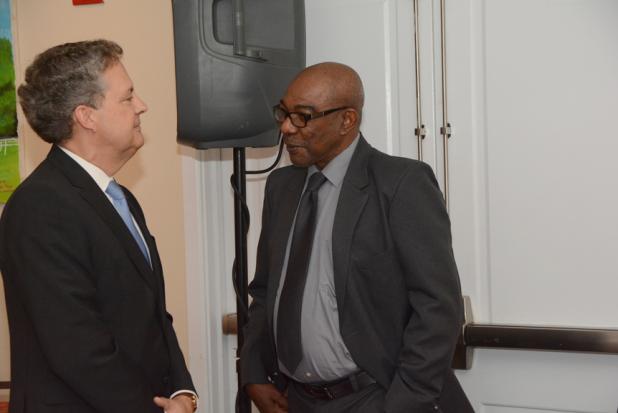
Percival Marie, Director General, CARIFORUM (right) speaking with Luis Maia,
Head of Cooperation, European Union at the three-day policy forum titled ‘Partnership
for Sustainable Development: The Caribbean and the Post -Cotonou Agenda’.
CARIFORUM Director General: ACP-EU relationship must be preserved, strengthened
The Caribbean Policy Development Centre (CPDC) is focused on developing a post-Cotonou agenda for regional civil society organisations in relation to the upcoming post Cotonou negotiations.
The CPC hosted a three-day policy forum at Courtyard by Marriott titled “Partnership for Sustainable Development: The Caribbean and the Post-Cotonou Agenda” for various civil society organisations from across the Caribbean to agree to advocacy positions on a post Contonu-agreement.
The meeting is being held as part of an $1.8 million Euro European Union funded initiative entitled, “Support to Facilitate Participation of CARIFORUM Civil Society in the Regional Integration Proses which is being implemented by the CPDC. This effort by CPDC comes as
CARIFORUM states are set to begin negotiations in September of 2018, as the current Cotonou agreement between Africa Caribbean and Pacific (ACP) and the European Union (EU) which was signed in 2000 expires in 2020.
In his opening address, Percival Marie, Director General, CARIFORUM, emphasised the importance of strengthening the relationship with the ACP-EU relations.
According to him, “From the Caribbean perspective, the fact that the EU is the most dependable global partner particularly in development cooperation is even more reason why the ACP-EU relationship must be preserved and strengthened.
The debt situation has become a burden to some countries notwithstanding modest growth shown by CARIFORUM States generally. The region’s vulnerabilities have become even more evident considering global financial and economic challenges and considering the impact of environmental degradation and climate change. Crime and security issues have assumed greater significance and the challenge of providing for a youthful population is becoming even more demanding and complex.
The ACP and the EU are about to commence negotiations for a post-Cotonou relationship. The only thing which has been constant in the relationship since 1975 has been change. The changes which have occurred have generally been positive. They represent rational, and in some instances negotiated reactions to change. The ACP has generally experienced benefits and positive actions from the ACP-EU relations in a variety of spheres and thematic areas.”
He added, “The foundation of the ACP-EU relations is strong, and it has persevered over time and despite numerous challenges. These challenges include economic and financial crisis, political pressures of migration, social and political pressures of migration, social and political changes in the ACP and EU States, new and emerging global challenges including terrorism, climate change and movement towards political extremism. The strong foundation of the relationship revolves around common principles including the respect for human rights, fundamental freedoms, democracy and the rule of law and good governance. They encompass a joint desire to promote sustainable and inclusive growth and development. They involve respect for the environment, the fight against climate change and justice as well as human development and dignity. Stakeholders must play these parts in taking the ACP-EU relationship forward. Civil Society must play their part. I want to assure Caribbean Civil Society that it can take the rightful plan in securing and promoting the interests of Caribbean people by contributing to these ACP-EU Post Cotonou negations.” (NB)
